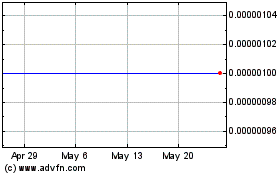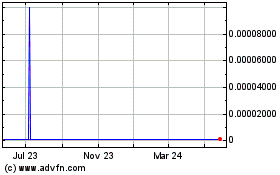Now Boarding: Enzyme Environmental Solutions
November 20 2008 - 12:38PM
Marketwired
As the company's followers will remember, EESO (PINKSHEETS: EESO)
presented its odor remediation technology a few months back to a
few key prospects worldwide garnering the technology some much
deserved praise. Since then, the company has been in talks with
companies and certain governmental entities toward utilizing the
technology to quantify odor overflow in areas and economies that
rely on livestock farming, particularly hog farms, as a mainstay.
One such economy is that of South Korea, where EESO's IP has
gotten significant attention. Attendee, Kwan Kim, was very
impressed and issued verbal intent immediately upon close of the
demo. Mr. Kim is Chief Consultant for a distributor of products to
hog farming industries worldwide, primarily in South Korea with
headquarters based in Toronto, Ontario, Canada.
Mr. Kim comments, "When I saw this technology, I knew it could
be of major importance to the South Korean economy in terms of its
ability to maintain, if not grow, its pork production, as odor has
been a leading cause for concern among Ministry of Finance and pig
and hog farms." Kim then returned to Toronto to discuss this with
his company's President, Mr. Chong Lee, who initiated contact with
EESO and its principal, Jared Hochstedler toward a mutually
agreeable, long-term order contract.
Chong Lee's response for comment was a thorough one: "Laws in
South Korea have been passed as of February 2005 with others
pending that may have a negative effect on domestic pork production
if something is not done. The Ministry of Environment (ME) has
installed regulations that would require facilities, including hog
farms, to install equipment to control odors. This and other
proposals to be adopted will cause the smaller, less profitable
swine farms rendered incapable of affording such equipment and they
may go out of business."
In addition, research on Lee's statement further supports that
the Ministry of Marine Affairs & Fisheries is placing
restrictions on the amount of livestock manure that can be dumped
in the open sea with the target of reducing this amount by 500,000
tons every year. As a result, manure disposal companies are
expected to raise their prices by 24 percent in 2009, although
increased fuel prices are also contributing to the rise in manure
disposal prices. MOMAF has also proposed to implement a requirement
by early 2009 that manure disposed in the open sea undergo residue
testing for 20 different substances. These very substances are the
ones that EESO's technology is designed to work with.
Enzyme Environmental Solutions' CEO and President Jared
Hochstedler confirms that negotiations have reached a mutually
agreeable contract with an order from Lee's company for private
label of the Odor Remediation formula technology in addition to
15-17 4,950 gallon containers of enzyme-based environmental and
agricultural products over the next year with an option on Lee's
side for 4 more years at minimum 30 containers per year. "This
first year order alone totals well over $7 million dollars for us
and if Lee's distribution continues to deliver a satisfactory
product to its recipients, as we believe it will, this deal alone
will garner, conservatively, around 40 million dollars over the
next five years for EESO. We're very proud to have made this
connection with Mr. Lee and his company and look forward to
exceeding his expectations in every way. Mr. Lee, in support of our
company and its mission statement has released his contact info as
(416) 709-6170 for press and other relevant media inquiries
regarding our new relationship."
"Overall, I think it's a great success and one we've been
working diligently to see through as we realize how important this
technology is... I think many people underestimate the looming
issues we have in the world regarding livestock odor and the many
effects it can have on communities and economies if not managed
properly," states Bill White, VP of Sales and Operations for EESO,
"... and it's definitely not just Korea, by far. The U.S. is a
major exporter of Pork and has even eliminated tariffs to its
exporters in many cases to remain competitive... We can't be misled
by the term 'hog farm.' The modern day hog factory has little in
common with the traditional family farm of the old days. Now it is
a highly mechanized, mass-production operation, especially here in
the states."
Safe Harbor: This release may contain forward-looking statements
within the meaning of the Private Securities Litigation Reform Act
of 1995. Statements contained in this release that are not
historical facts may be deemed to be forward-looking statements.
Investors are cautioned that forward-looking statements are
inherently uncertain. Actual performance and results may differ
materially from that projected or suggested herein due to certain
risks and uncertainties including, without limitation, ability to
obtain financing and regulatory and shareholder approvals for
anticipated actions.
Contact: Newbauer Media Relations Enzyme Environmental Solutions
Email: mark@enzymeconsultants.com
Enzyme Environmental Sol... (CE) (USOTC:EESO)
Historical Stock Chart
From Jun 2024 to Jul 2024

Enzyme Environmental Sol... (CE) (USOTC:EESO)
Historical Stock Chart
From Jul 2023 to Jul 2024
